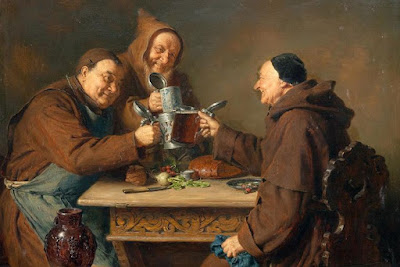Click to enlarge
As a follow-up to the significant research I have done in regard to Traditional (both Roman and Eastern) Catholic fasting and abstinence, I have put together a 2022 fasting and abstinence calendar for my own devotional purposes. I share it here so that anyone who wishes to better observe the Church's precepts may do so. As our Lady of Fatima has pleaded with us to advance in prayer and penance, fasting beyond the mere minimum should be the aspiration for all Catholics who are physically able to do so.
Traditional Catholic Fasting Rules:
Fasting: Fasting refers to how much food we eat. It means taking only one meal during a calendar day. The meal should be an average-sized meal as overeating at the one meal is against the spirit of the fast. Fasting generally means that the meal is to be taken later in the day. Along with the one meal, up to two snacks (technically called either a collation or frustulum) are permitted. These are optional, not required. Added up together, they may not equal the size of the one meal. No other snacking throughout the day is permitted. Fasting does not affect liquids,
aside from the Eucharistic Fast which is a separate matter.
Abstinence: Abstinence in this context refers to not eating meat. Meat refers to the fleshmeat of mammals or fowl. Beef, poultry, lamb, etc are all forbidden on days of abstinence. Abstinence does not currently prohibit animal byproducts like dairy (e.g. cheese, butter, milk) or eggs, but in times past they were prohibited. Fish is permitted along with shellfish and other cold-blooded animals like alligators. In times past, days of fast were always days of abstinence as well; however, not all days of abstinence were days of mandatory fasting.
Partial Abstinence: Partial Abstinence refers to eating meat only at the principal meal of the day. Days of partial abstinence do not permit meat to be eaten as part of the collation or the frustulum. Partial abstinence
started only in 1741 under Pope Benedict XIV as a concession and as part of a gradual weakening of discipline. Beforehand, days of abstinence were days of complete abstinence.
Fasting, therefore, refers to the quantity of food and the frequency of eating. Abstinence refers to what may or may not be eaten.
Calendar Notes:
1. Partial Abstinence is a modern invention and is not part of this calendar. Abstinence is always full, never partial.
2. All Days of Lent aside from Sundays are days of fasting and abstinence. Sundays are days only of abstinence.
3. For Lent only abstinence refers to all animal products (e.g. dairy, butter, eggs) in addition to meat. This includes Sundays.
4. January 22nd is in the USA only an obligatory day of penance for offenses against the dignity of human life.
5. This calendar keeps the 1954 Roman Catholic Calendar and the pre-1917 practice of anticipating Vigils on Saturday that fall on Sunday in a given year.
6. Major Fasts: Great Lent (March 2 - April 16), Apostles Fast (June 13 - June 28), Dormition Fast (Aug 1 - Aug 14), St. Martin's Lent (Nov 14 - Dec 24).
7. Dominican Specific Fasting Days: April 29, August 3, and October 6 are not on the calendar but will be observed by Dominican Tertiary per the 1923 Rule (the last one before Vatican II). Same with all Fridays of the year which Dominicans are asked to keep as days of fasting.
8. Days of fasting generally include all of the Major Fasts as noted above in addition to the following days when they fall outside of those periods: Ember Days, Vigils of the Apostles, and Vigils for Major Feasts. Rogation Days were often days of abstinence but not fast.
9. Saturday Abstinence used to be obligatory year-round with some exceptions for days "as often as no major solemnity (e.g. Christmas) occurs on Saturday, or no infirmity serves to cancel the obligation.” One exception granted in some places was for all Saturdays of the Christmas Season to be exempted.
10. Above all, this calendar goes far beyond the mere "minimums" which are virtually non-existent and attempts to present concrete ways for Catholics to actually fast in the manner as our forefathers did.
Not listed but certainly recommendable based on the Early Church's practice of Wednesday penance (and based on the wishes of Our Lady of Mount Carmel), would be to also observe abstinence year-round on Wednesdays (beyond the dates noted on the calendar). Such a practice would be commendable on all additional Wednesdays of the year with exemptions when either a Holy Day of Obligation, Former Holy Day of Obligation, or First Class Feast falls.
For those interested in understanding the various ways fasting and abstinence have changed over time, please explore the archives regarding fasting and abstinence. And for those looking for ideas on what to make to eat on fasting days, the Lenten Cookbook produced by Sophia Institute Press has a section on vegan recipes that is worth checking out.















